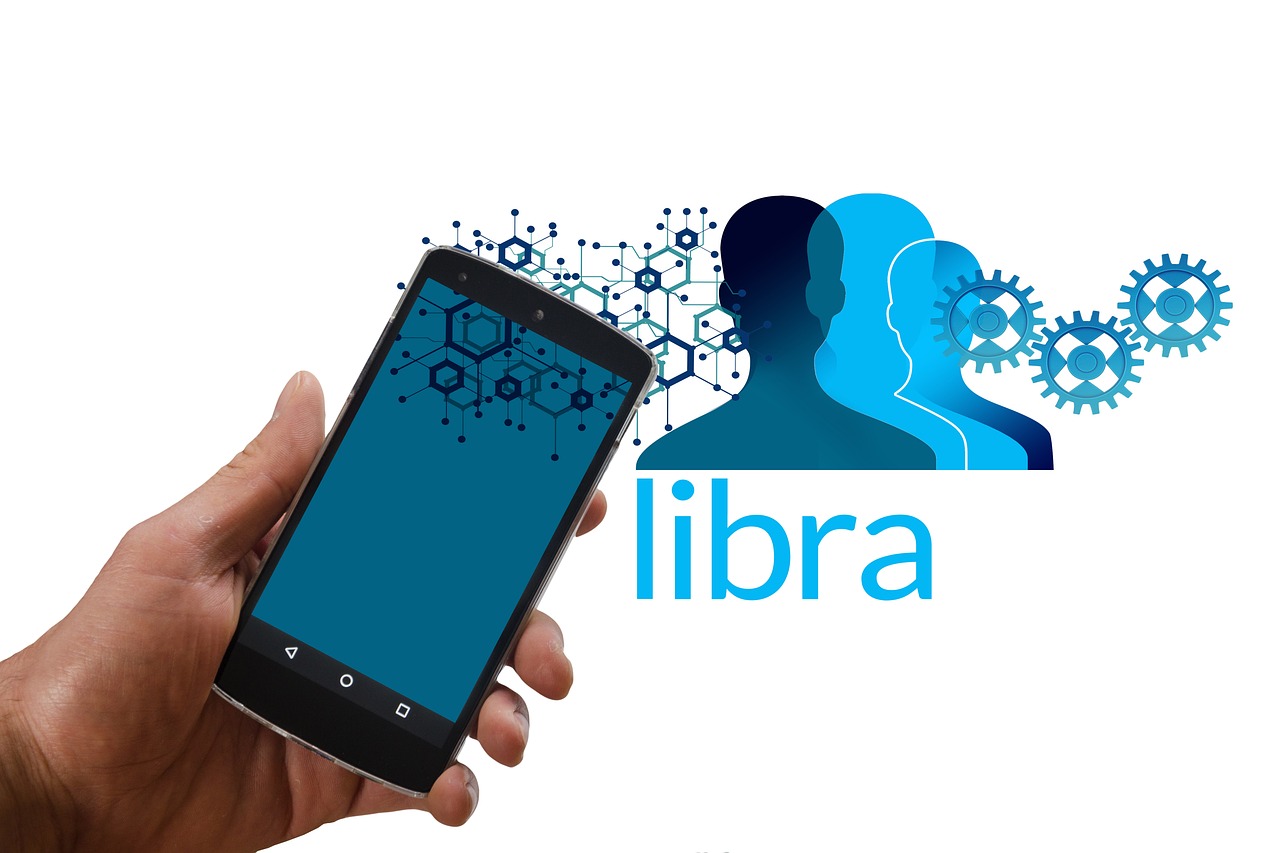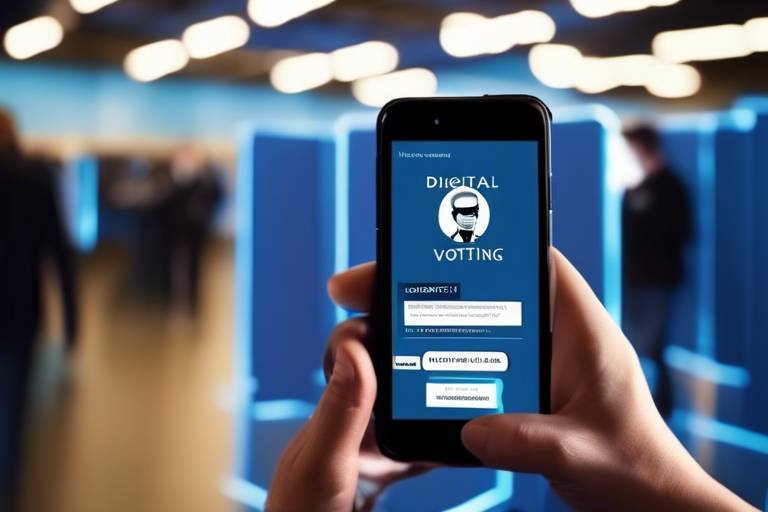Exploring the Role of Blockchain in Digital Marketing
In recent years, the digital marketing landscape has undergone significant transformations, and one of the most revolutionary technologies driving this change is blockchain. This decentralized ledger technology is not just a buzzword; it's reshaping how brands interact with consumers, manage data, and conduct transactions. Imagine a world where every click, every interaction, and every transaction is recorded in a secure, transparent manner. Sounds intriguing, right? Well, that’s the promise of blockchain in digital marketing!
At its core, blockchain offers a level of transparency and security that traditional marketing methods simply cannot match. With the rise of data breaches and privacy concerns, consumers are becoming increasingly wary of how their information is handled. Blockchain technology provides a solution to these concerns by allowing users to maintain control over their personal data. This not only enhances trust between consumers and brands but also creates a more engaging and personalized marketing experience.
Furthermore, the efficiency of blockchain can streamline various marketing processes. Think about all the time and resources spent on verifying transactions, managing customer data, and tracking advertising performance. With blockchain, many of these processes can be automated and made more efficient through the use of smart contracts. These self-executing contracts with the terms of the agreement directly written into code can significantly reduce costs and enhance accountability in marketing efforts.
As we dive deeper into this article, we will explore how blockchain technology is enhancing data privacy, improving transparency in advertising, and ultimately building trust with consumers. We’ll also take a look at real-world case studies that illustrate how innovative brands are successfully integrating blockchain into their marketing strategies. So, buckle up as we embark on this exciting journey into the world of blockchain and digital marketing!
Before we delve into the specifics of blockchain’s impact on digital marketing, it’s essential to understand what blockchain technology is all about. At its essence, blockchain is a decentralized ledger that records transactions across many computers. This means that no single entity has control over the entire chain, making it incredibly secure and resistant to tampering.
Every transaction or piece of data is stored in a block, and once a block is filled, it is added to the chain in a linear, chronological order. This structure not only enhances security but also provides a clear and immutable record of transactions. Imagine it as a digital diary where every entry is permanent and cannot be erased. This level of transparency is what sets blockchain apart from traditional data management systems.
As we move forward, we will see how these fundamental principles of blockchain can be applied to digital marketing, enhancing various aspects such as data privacy, consumer trust, and overall marketing efficiency.
In today's digital age, data privacy is a hot topic. With frequent news about data breaches and misuse of personal information, consumers are rightfully concerned about their privacy. Here’s where blockchain shines! By using blockchain, consumers can gain control over their data, deciding who can access it and how it can be used. This shift empowers users and can lead to more trustworthy relationships between brands and consumers.
Imagine being able to choose which companies can access your personal information and for what purpose. Blockchain enables this level of control, allowing consumers to manage their identities and data securely. This empowerment can foster loyalty and engagement, as consumers feel more confident in sharing their information with brands they trust.
Blockchain can facilitate decentralized identity systems, verifying user identities without relying on central authorities. This innovation not only enhances security but also streamlines customer interactions in digital marketing. For instance, when a user logs into a service using a blockchain-based identity, they can do so without the need for multiple passwords or personal information, making the process seamless and secure.
Smart contracts are another fascinating aspect of blockchain technology. These self-executing contracts automate transactions and agreements between parties on the blockchain. In marketing, this means that brands can automate processes such as affiliate marketing, payments, and even customer loyalty programs, reducing costs and enhancing accountability.
One of the most significant advantages of blockchain in digital marketing is the transparency it offers. Brands can track ad performance and combat fraud through immutable records. This means that every click, impression, and conversion is recorded in a way that cannot be altered, providing brands with accurate and reliable data.
Trust is a cornerstone of any successful marketing strategy. By leveraging blockchain’s transparency and security features, brands can enhance consumer trust, leading to stronger relationships and increased sales. When consumers know they are dealing with a brand that values their privacy and data security, they are more likely to engage and make purchases.
Blockchain can also help verify the authenticity of products and services, reducing the risk of counterfeiting. For example, luxury brands can use blockchain to prove the provenance of their products, ensuring that consumers are buying genuine items. This feature not only builds credibility but also enhances consumer confidence in the brand.
To truly understand the impact of blockchain in digital marketing, it’s helpful to look at real-world examples. Companies across various industries are successfully integrating blockchain into their marketing strategies, leading to impressive outcomes. From improved data privacy to enhanced transparency in advertising, these case studies showcase the technology's potential and the innovative ways brands are using it to connect with consumers.
- What is blockchain? Blockchain is a decentralized ledger technology that securely records transactions across multiple computers.
- How does blockchain enhance data privacy? It allows consumers to control who can access their personal data, fostering trust between brands and users.
- What are smart contracts? Smart contracts are self-executing contracts with the terms of the agreement directly written into code, automating transactions.
- Can blockchain reduce advertising fraud? Yes, it provides transparent and immutable records of ad performance, helping brands track and verify their campaigns.

Understanding Blockchain Technology
Blockchain is a decentralized ledger technology that has taken the world by storm, and for good reason! Imagine a digital notebook that everyone can see but no one can erase. That’s essentially what blockchain is—a secure and transparent way to record transactions. Each transaction is stored in a block, and these blocks are linked together in a chain (hence the name). This structure not only ensures that data is immutable but also allows for real-time updates that can be viewed by all parties involved.
At its core, blockchain operates on a few fundamental principles. First, it is decentralized, meaning that no single entity has control over the entire network. This is akin to a public library where everyone has access to the same books, but no one person owns them. Second, blockchain is transparent. Every transaction is recorded and can be viewed by anyone with access to the network, promoting accountability. Lastly, it is secure. Advanced cryptographic techniques protect the data, making it extremely difficult for hackers to alter the information.
To truly grasp the potential applications of blockchain in digital marketing, it's essential to understand how it can change traditional practices. Here are a few key aspects:
- Decentralization: This reduces the risk of data breaches and fraud, as there is no central point of failure.
- Transparency: Brands can provide verifiable proof of their claims, whether that’s regarding product sourcing or advertising metrics.
- Efficiency: By automating processes through smart contracts, businesses can streamline operations and reduce costs.
As digital marketing continues to evolve, the integration of blockchain technology promises to revolutionize the way brands interact with consumers. Imagine a world where you, as a consumer, have complete control over your data, and brands can prove their authenticity without any doubt. This is not just a dream; it’s a rapidly approaching reality.
Understanding blockchain is the first step towards leveraging its potential in marketing. By embracing this technology, businesses can not only enhance their operational efficiency but also build stronger, more trustworthy relationships with their customers. So, as we dive deeper into this topic, keep in mind the transformative power of blockchain and how it can redefine the landscape of digital marketing.

Enhancing Data Privacy
In today's digital landscape, where data breaches and privacy concerns are rampant, has become a paramount goal for both consumers and brands. Enter blockchain technology, a game changer that offers a new way to secure personal information while empowering users. Imagine a world where you, as a consumer, hold the keys to your own data, deciding who gets to see it and when. Sounds revolutionary, right? That's precisely what blockchain promises to deliver, reshaping the very fabric of data handling in marketing.
At its core, blockchain operates on a decentralized model, meaning that no single entity has control over the data. This decentralization is crucial in enhancing privacy because it minimizes the risk of data being compromised by a central authority. Instead of your information being stored in a vulnerable server, it is distributed across a network of computers, making unauthorized access significantly more challenging. This level of security not only protects your data but also builds a sense of trust between consumers and brands, as users can feel confident that their information is safeguarded.
One of the most exciting aspects of blockchain is its ability to give consumers control over their data. With traditional marketing methods, consumers often have little say in how their information is collected or used. However, blockchain changes the narrative. By utilizing blockchain, users can manage their personal data through decentralized identity systems. These systems allow individuals to verify their identity without relying on centralized authorities, such as social media platforms or banks. This shift not only enhances security but also streamlines customer interactions, making it easier for brands to engage with their audience in a meaningful way.
Furthermore, blockchain technology facilitates the use of smart contracts. These self-executing contracts operate on the blockchain and automatically enforce agreements when predetermined conditions are met. In the context of data privacy, smart contracts can ensure that personal information is only shared with consent and under specific circumstances. This level of automation not only reduces the potential for human error but also enhances accountability in how data is handled. Brands can demonstrate their commitment to privacy by integrating smart contracts into their marketing strategies, thus fostering a stronger relationship with consumers.
In summary, blockchain technology is paving the way for a new era of data privacy in digital marketing. By decentralizing data management, empowering consumers, and utilizing smart contracts, brands can create a more secure and trustworthy environment for their customers. As we continue to navigate the complexities of the digital age, embracing blockchain could be the key to building lasting relationships based on transparency and respect for privacy.

Consumer Control Over Data
The digital age has ushered in a new era of data collection, where every click and interaction is meticulously recorded by companies. This has raised significant concerns about privacy and data ownership. Enter blockchain technology, a game-changer that empowers consumers to take back control over their personal information. Imagine a world where you, the consumer, are not just a passive participant but an active player in deciding who gets access to your data. Sounds revolutionary, right?
Blockchain provides a decentralized framework that allows individuals to manage their data without the need for intermediaries. This means that instead of a corporation holding your data and deciding how it can be used, you have the power to grant or revoke access as you see fit. This shift in power dynamics can lead to more trustworthy relationships between brands and consumers. When consumers feel they have control over their data, they are more likely to engage with brands and share their information willingly, fostering loyalty and enhancing overall engagement.
Let’s break this down further. With traditional data management systems, consumers often have little visibility into how their data is being used. However, with blockchain, every transaction is recorded on an immutable ledger. This transparency allows consumers to see exactly who has accessed their information and for what purpose. It’s like having a personal security camera for your data. You can monitor who enters your digital space and ensure that only those you trust are allowed in.
Furthermore, blockchain technology supports the concept of Decentralized Identity Management. This innovative approach means that consumers can verify their identities without relying on central authorities, such as banks or social media platforms. Instead, they can use cryptographic proofs stored on the blockchain. This not only enhances security but also streamlines customer interactions in digital marketing. For instance, when signing up for services or making purchases, consumers can authenticate themselves without sharing excessive personal information, thus reducing the risk of data breaches.
In summary, the integration of blockchain into digital marketing is paving the way for a more consumer-centric approach. By granting individuals control over their data, brands can establish stronger, more transparent relationships with their customers. As consumers gain confidence in how their information is handled, we can expect to see an increase in engagement and loyalty, ultimately benefiting both parties in the long run.
- How does blockchain give consumers control over their data?
Blockchain allows consumers to manage who has access to their personal information, enhancing privacy and security. - What is decentralized identity management?
This is a system that enables users to verify their identities without relying on central authorities, using cryptographic proofs instead. - Can blockchain reduce data breaches?
Yes, by allowing consumers to share only necessary information and manage access, blockchain can significantly lower the risk of data breaches.

Decentralized Identity Management
In today's digital landscape, identity management has become a critical issue, particularly as data breaches and privacy concerns continue to rise. (DIM) offers a revolutionary approach that leverages blockchain technology to empower individuals. Imagine a world where you hold the keys to your personal information, deciding who gets access and when. This is the promise of DIM, which is designed to eliminate the need for central authorities that often mishandle or misuse personal data.
At its core, decentralized identity management utilizes blockchain's secure and transparent nature to create a self-sovereign identity. This means that users can manage their identities without relying on third-party organizations, which have traditionally acted as gatekeepers. Instead of storing sensitive information on a centralized server, DIM allows users to keep their data encrypted on their devices or in a blockchain network. This shift not only enhances security but also gives users more control over their personal information.
How does this work in practice? With DIM, users can create a digital identity that includes verified credentials. For instance, a user might have a digital wallet that contains their driver's license, passport, and other identification documents. When they need to prove their identity—say, while signing up for a service or verifying their age—they can share only the necessary information without exposing their entire identity. This selective sharing minimizes the risk of identity theft and fraud.
Furthermore, decentralized identity management can significantly streamline customer interactions in digital marketing. Brands can verify user identities without collecting excessive personal data, which not only protects consumer privacy but also builds trust. When customers know that their information is secure and that they have control over it, they are more likely to engage with brands. This leads to not just improved customer relationships but also enhanced loyalty, as consumers feel respected and valued.
To sum it up, decentralized identity management is not just a technological advancement; it’s a paradigm shift in how we think about identity in the digital age. By leveraging blockchain technology, brands can foster a more secure, transparent, and trustworthy environment that benefits both businesses and consumers. The implications for digital marketing are profound, as this approach encourages a more ethical handling of data while enhancing user engagement.
- What is decentralized identity management?
Decentralized identity management is a system that allows individuals to control their personal information without relying on central authorities, using blockchain technology for security and transparency. - How does DIM enhance security?
DIM enhances security by allowing users to store their identity information in encrypted formats, reducing the risk of data breaches and unauthorized access. - Can brands verify identities using DIM?
Yes, brands can verify identities without collecting excessive personal data, which helps build trust with consumers. - What are the benefits of using DIM for consumers?
Consumers benefit from increased control over their personal data, improved security against identity theft, and a more trustworthy relationship with brands.

Smart Contracts in Marketing
In the rapidly evolving landscape of digital marketing, smart contracts have emerged as a groundbreaking innovation that can revolutionize how businesses operate and engage with their customers. But what exactly are smart contracts? Think of them as self-executing contracts with the terms of the agreement directly written into code. This technology operates on the blockchain, ensuring that every transaction is secure, transparent, and immutable. Imagine a world where marketing agreements are automatically enforced without the need for intermediaries—this is the promise of smart contracts.
One of the most significant advantages of smart contracts in marketing is their ability to automate processes. For instance, when a customer makes a purchase, the smart contract can automatically trigger the delivery of the product or service, as well as the payment to the vendor, all without human intervention. This not only speeds up transactions but also reduces the risk of errors that can occur in manual processes. Moreover, it enhances accountability, as all actions are recorded on the blockchain, providing a clear audit trail.
Furthermore, smart contracts can be tailored to suit specific marketing campaigns. For example, consider a scenario where a brand wants to reward customers for engaging with their content on social media. A smart contract can be programmed to automatically distribute rewards, such as discounts or loyalty points, when certain conditions are met, like sharing a post or leaving a review. This level of automation not only enhances customer engagement but also incentivizes desired behaviors.
Additionally, the use of smart contracts can significantly reduce costs associated with traditional marketing methods. By eliminating the need for intermediaries, such as payment processors or legal advisors, brands can allocate their budgets more efficiently. This cost-effectiveness can lead to better pricing for consumers, creating a win-win situation for both parties.
However, while the benefits are compelling, it’s essential to consider the challenges that come with implementing smart contracts in marketing. For instance, the initial setup might require technical expertise and investment in blockchain technology. Brands must also ensure that they comply with legal regulations surrounding smart contracts, which can vary by jurisdiction.
In conclusion, smart contracts hold remarkable potential for transforming marketing strategies. They offer a way to automate processes, enhance accountability, and reduce costs, all while building stronger relationships with consumers. As businesses continue to explore the capabilities of blockchain technology, the integration of smart contracts could very well become a standard practice in the marketing realm.
- What are smart contracts? Smart contracts are self-executing contracts with the terms of the agreement directly written into code on a blockchain.
- How do smart contracts benefit digital marketing? They automate processes, enhance accountability, reduce costs, and can be tailored to specific marketing campaigns.
- Are there any challenges with implementing smart contracts? Yes, challenges include the need for technical expertise, initial setup costs, and compliance with legal regulations.
- Can smart contracts improve consumer trust? Absolutely! By ensuring transparency and security in transactions, smart contracts can foster greater trust between brands and consumers.

Improving Transparency in Advertising
In the fast-paced world of digital marketing, transparency has become a buzzword that companies strive to achieve. But what does it really mean, and how can blockchain technology help? Imagine a world where every ad dollar spent is accounted for, where brands can see exactly where their money goes, and consumers can trust what they see. This is the promise of blockchain in advertising. By utilizing a decentralized ledger, brands can track their advertising campaigns in real-time, ensuring that every impression, click, and conversion is recorded accurately and immutably. This not only enhances accountability but also builds trust between brands and their audiences.
One of the most significant challenges in digital advertising is the prevalence of fraud. According to industry estimates, billions of dollars are lost each year to fraudulent clicks and impressions. Blockchain can combat this issue by providing a transparent trail of transactions that can be audited by all parties involved. For instance, if a brand runs an ad campaign, they can verify the authenticity of the impressions and clicks through the blockchain. This means no more guessing games or shady practices; everything is out in the open. Imagine the peace of mind for marketers knowing that their ad spend is going exactly where it should.
Furthermore, the transparency offered by blockchain allows for better data sharing and collaboration between advertisers and publishers. Instead of relying on third-party intermediaries, which can often distort data, blockchain enables direct communication. This directness not only improves the accuracy of data but also reduces the costs associated with middlemen. Brands can negotiate better deals and optimize their campaigns based on real-time data, leading to more effective advertising strategies.
To illustrate how blockchain enhances transparency in advertising, consider the following table that outlines the differences between traditional advertising methods and those utilizing blockchain technology:
| Aspect | Traditional Advertising | Blockchain Advertising |
|---|---|---|
| Data Accuracy | Often distorted by third parties | Immutable and verifiable records |
| Fraud Prevention | High risk of click fraud | Transparent tracking reduces fraud |
| Cost Efficiency | High fees for intermediaries | Lower costs due to direct transactions |
| Campaign Optimization | Delayed data reporting | Real-time data for immediate adjustments |
In conclusion, the integration of blockchain technology into advertising represents a significant shift towards a more transparent and trustworthy digital marketing landscape. With the ability to track every aspect of an advertising campaign, brands can ensure that they are not only spending their budgets wisely but also building stronger relationships with their consumers. As we continue to navigate the complexities of digital marketing, embracing transparency through blockchain will be essential for long-term success.
Frequently Asked Questions
- What is blockchain technology?
Blockchain is a decentralized ledger that records transactions across many computers, ensuring that the recorded data cannot be altered retroactively. - How does blockchain improve advertising transparency?
It provides a secure and immutable record of transactions, allowing brands to track ad performance and spending accurately. - Can blockchain reduce advertising fraud?
Yes, by offering transparent tracking of ad impressions and clicks, blockchain can significantly reduce the risk of fraud. - What are the benefits of using blockchain in digital marketing?
Benefits include enhanced transparency, reduced costs, improved data accuracy, and stronger consumer trust.

Building Trust with Consumers
In the fast-paced world of digital marketing, trust is like the golden key that unlocks doors to lasting relationships between brands and consumers. With consumers becoming increasingly savvy and aware of their rights, brands must find innovative ways to establish and maintain trust. This is where blockchain technology steps in as a game-changer. By leveraging the inherent features of blockchain, such as transparency and security, brands can create a more trustworthy environment for their customers.
Imagine walking into a store where every product has a digital certificate verifying its authenticity. This is precisely what blockchain can do. It allows brands to provide consumers with a transparent view of their supply chains, ensuring that every product is genuine and ethically sourced. With blockchain, consumers can trace the journey of a product right from its origin to the store shelf, fostering a sense of confidence in their purchases.
Moreover, the ability to verify product authenticity through blockchain can significantly reduce the risks of counterfeit goods. In a world where fake products can tarnish a brand's reputation and consumer trust, blockchain offers a reliable solution. Brands can showcase their commitment to quality and integrity by providing consumers with verifiable proof of authenticity. This not only enhances consumer confidence but also strengthens brand loyalty.
To illustrate the impact of blockchain on building consumer trust, consider the following table that highlights key benefits:
| Benefit | Description |
|---|---|
| Transparency | Consumers can view the entire supply chain, ensuring products are genuine and ethically sourced. |
| Security | Blockchain's decentralized nature reduces the risk of data breaches and fraud. |
| Accountability | Immutable records of transactions hold brands accountable for their claims. |
| Consumer Empowerment | Consumers have control over their data and can choose what to share with brands. |
In addition to product authenticity, blockchain also plays a crucial role in enhancing data privacy. In today's digital landscape, consumers are increasingly concerned about how their personal information is being used. Blockchain technology empowers consumers by giving them control over their data. Instead of brands hoarding personal information, consumers can decide who gets access to their data and under what circumstances. This shift not only fosters trust but also encourages greater engagement between brands and consumers.
Furthermore, the implementation of smart contracts in marketing can also contribute to building trust. Smart contracts are self-executing contracts with the terms of the agreement directly written into code. This means that transactions are automated and transparent, reducing the chances of disputes. By utilizing smart contracts, brands can assure consumers that their commitments will be honored, further solidifying trust.
As we navigate the evolving landscape of digital marketing, it's clear that blockchain technology holds immense potential for building trust with consumers. By enhancing transparency, security, and accountability, brands can cultivate stronger relationships with their customers. In a world where trust is paramount, embracing blockchain could be the key to unlocking new levels of consumer loyalty and engagement.
- How does blockchain increase transparency in marketing?
Blockchain provides an immutable record of transactions, allowing consumers to verify the authenticity and origin of products. - Can blockchain improve data privacy for consumers?
Yes, blockchain gives consumers control over their personal data, allowing them to decide who can access it. - What are smart contracts and how do they work in marketing?
Smart contracts are automated agreements that execute transactions based on predetermined conditions, ensuring accountability and reducing disputes. - How can brands use blockchain to combat counterfeit products?
By providing verifiable proof of authenticity through blockchain, brands can reduce the risk of counterfeit goods and build consumer confidence.

Verification of Authenticity
In today’s digital marketplace, consumers are more aware than ever about the authenticity of the products they purchase. With the rise of counterfeit goods and misleading marketing practices, the need for a reliable method of verification has never been more critical. Blockchain technology offers a revolutionary solution to this problem by providing a transparent and immutable record of transactions. This means that every product can be traced back to its origin, ensuring that consumers can verify its authenticity with just a few clicks. Imagine buying a luxury handbag and being able to scan a QR code that reveals its entire history—from the factory where it was made to the retailer selling it. This level of transparency not only enhances consumer confidence but also fosters a deeper connection between brands and their customers.
The concept of verification through blockchain is grounded in the principle of decentralization. Unlike traditional systems that rely on a single source of truth, blockchain distributes data across a network of computers, making it nearly impossible to alter or falsify. This characteristic is particularly beneficial for brands that want to prove the authenticity of their products. For instance, a company that produces organic food can use blockchain to provide verifiable proof of its sourcing practices, allowing consumers to feel assured that what they are purchasing is genuinely organic. By leveraging this technology, brands can effectively communicate their commitment to quality and integrity.
Furthermore, the verification process can be streamlined through the use of smart contracts. These self-executing contracts automatically verify the conditions of the transaction without the need for intermediaries. For example, when a product is sold, a smart contract can automatically update the blockchain to reflect the sale, providing an immediate and verifiable record. This not only reduces the risk of fraud but also enhances operational efficiency, allowing brands to focus on what they do best—delivering high-quality products and services to their customers.
To illustrate the impact of blockchain on verification, let’s take a look at some real-world examples. Several companies in the fashion industry have started using blockchain to authenticate their products. For instance, Everledger is a technology company that uses blockchain to track the provenance of diamonds, ensuring that they are conflict-free. By providing a transparent history of each diamond, Everledger helps to build trust with consumers who are increasingly concerned about ethical sourcing. Similarly, brands like Provenance are enabling businesses to share their product stories with consumers, allowing them to verify claims about sustainability and ethical practices.
In conclusion, the verification of authenticity through blockchain technology not only combats fraud but also enhances consumer trust. As brands increasingly adopt this technology, they are not just protecting their integrity but are also building stronger relationships with their customers. In a world where trust is paramount, the ability to verify authenticity in real-time will be a game-changer for the digital marketing landscape.
- What is blockchain technology?
Blockchain is a decentralized ledger technology that securely records transactions across a network of computers.
- How does blockchain enhance product authenticity?
By providing an immutable record of product history, blockchain allows consumers to verify the authenticity of items before purchasing.
- What are smart contracts?
Smart contracts are self-executing contracts with the terms of the agreement directly written into code, enabling automatic verification of transactions.
- Can blockchain help in preventing counterfeit goods?
Yes, blockchain's transparency and traceability features significantly reduce the chances of counterfeit goods entering the market.

Case Studies of Blockchain in Marketing
As we delve into the fascinating world of blockchain in marketing, it’s essential to look at real-world applications that showcase its transformative power. Numerous companies are already harnessing blockchain technology to revolutionize their marketing strategies, leading to increased efficiency, transparency, and consumer trust. Let's explore some remarkable case studies that illustrate how brands are leveraging this innovative technology.
One standout example is Unilever, a global consumer goods giant. They have implemented a blockchain-based system to enhance transparency in their supply chain. By tracking the journey of their products from source to shelf, Unilever not only ensures the authenticity of their goods but also communicates this transparency to consumers. This initiative has boosted consumer confidence, as shoppers can verify the origins of their products, reinforcing the brand's commitment to sustainability and ethical sourcing.
Another intriguing case is that of Provenance, a startup that utilizes blockchain to provide consumers with verifiable information about the products they purchase. By scanning a QR code on the product packaging, consumers can access a detailed history of the item, including its production process and supply chain. This level of transparency not only helps in combating counterfeit products but also fosters a deeper connection between brands and consumers, as they appreciate the effort taken to ensure authenticity.
Moreover, Walmart has embraced blockchain technology to enhance food safety. By implementing a blockchain system to track the sourcing of their produce, Walmart can trace back any food safety issues to their origin in mere seconds. This capability drastically reduces the time needed for recalls and ensures that consumers receive safe products. The initiative has not only improved operational efficiency but has also significantly increased consumer trust in Walmart’s commitment to food safety.
In the realm of advertising, AdEx has emerged as a pioneer by using blockchain to create a decentralized ad exchange platform. This platform allows advertisers and publishers to connect directly without intermediaries, reducing costs and improving transparency. By utilizing smart contracts, AdEx ensures that payments are made only when ads are viewed, thereby combating fraud in digital advertising. This innovative approach has attracted numerous advertisers looking for more accountability and effectiveness in their campaigns.
These case studies highlight the diverse applications of blockchain in marketing, showcasing its potential to enhance transparency, security, and efficiency. As more brands recognize the value of this technology, we can expect to see an even greater shift in how marketing operates, ultimately leading to stronger relationships between brands and consumers.
- What is blockchain technology?
Blockchain is a decentralized and secure digital ledger that records transactions across multiple computers, ensuring that the data is immutable and transparent. - How does blockchain enhance data privacy?
Blockchain allows consumers to control their personal data, deciding who can access it, which leads to more trust and better relationships with brands. - Can blockchain reduce advertising fraud?
Yes, blockchain provides transparency in advertising transactions, allowing brands to verify ad performance and reduce fraudulent activities. - What are smart contracts?
Smart contracts are self-executing contracts with the terms of the agreement directly written into code, automating transactions and enhancing accountability.
Frequently Asked Questions
-
What is blockchain technology?
Blockchain technology is a decentralized digital ledger that securely records transactions across multiple computers. This ensures that the recorded data cannot be altered retroactively, providing a high level of transparency and security.
-
How does blockchain enhance data privacy in digital marketing?
Blockchain empowers consumers by allowing them to control their personal data. Users can decide who accesses their information, which fosters a sense of trust and security between brands and consumers.
-
What are smart contracts and how do they work in marketing?
Smart contracts are self-executing contracts with the terms of the agreement directly written into code. In marketing, they automate transactions and agreements, reducing the need for intermediaries, thus saving time and costs while enhancing accountability.
-
Can blockchain improve transparency in advertising?
Absolutely! Blockchain provides a transparent record of advertising campaigns, enabling brands to track performance accurately and combat ad fraud. This transparency can lead to more effective advertising strategies and increased trust from consumers.
-
How does blockchain help in verifying product authenticity?
Blockchain can verify the authenticity of products by creating an immutable record of their journey from production to sale. This feature significantly reduces the risk of counterfeiting, thereby building consumer confidence in the brand.
-
Are there real-world examples of blockchain in marketing?
Yes, many companies are integrating blockchain into their marketing strategies. For instance, brands are using it to enhance supply chain transparency and ensure that consumers receive genuine products. These case studies demonstrate the technology's potential impact on the industry.



















